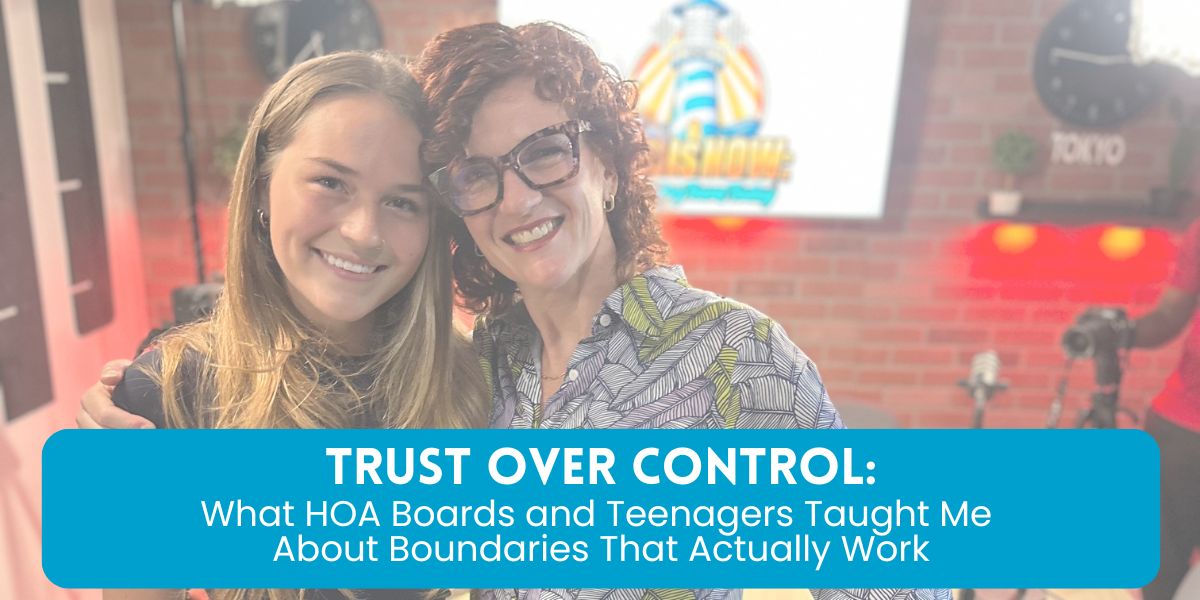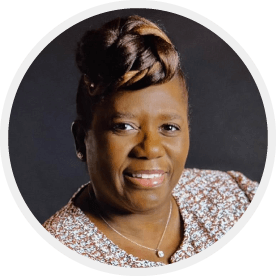By Stephanie Parker
As President of First Service Residential South Florida, Stephanie Parker is a seasoned executive in residential property management, specializing in HOA and condominium board governance. Outside the boardroom, she’s a devoted mother of two and an advocate for trust-based parenting. She believes the best boundaries—whether in communities or families—are built on respect, not control.
There’s a saying: “Set the rule before the chaos, not in response to it.” As someone who has spent years navigating organizations across various industries and geographies, including homeowner associations and condo boards, I can tell you that boundaries, also known as clear expectations, are everything. But boundaries and expectations without mutual respect? Not effective.
It turns out that the same applies to parenting teenagers.
When my kids reached their teenage years, I quickly realized that control only takes you so far. What really matters is trust—and not just the “I trust you until you mess up” kind. I’m talking about respect that runs both ways. The kind of trust where your teen can say, “Hey, something’s off,” and know you’ll listen before you lecture.
Curfews Were Never the Point
I didn’t give my kids strict curfews. Not because I didn’t care—but because I wanted them to care. I wanted them to feel their own consequences, not just fear mine. When my daughter stayed out too late and had to navigate a rough next day? That was a better teacher than any punishment I could have handed down.
We talked about plans. About outcomes. About what “good decisions” look like in real time. That doesn’t mean I wasn’t scared. I was. I still am, sometimes. But I reminded myself that if I wanted them to call me when it really mattered, I had to create a relationship that didn’t center around fear.
Respect Is Not Soft
When I say my approach is rooted in mutual respect, I don’t mean it’s soft. Respect requires accountability. But it also means modeling what you expect.
I’ve always told my kids: I’ll get you out of a situation first, and we’ll talk later. That’s true whether you’re my child—or your friend is. I’ve had teens who weren’t mine call me in the middle of the night, and I always meant it when I said, “I’m not promising to keep secrets from your parents—but I will come get you.”
That trust is sacred. And I don’t take it lightly.
Different Kids, Different Needs
I parent my children differently. Not because I love one more or less—but because they’re not the same person. My son is quieter. He thrives when given space to think it through on his own. . My daughter is expressive, intuitive, and does much of her problem solving while talking things through with me. (she actually asks to talk things through…) Both are deeply independent. They didn’t need me hovering—they needed me to believe in her. And they knew when I did.
That doesn’t mean I got it right every time. But I listened. I adjusted. And I gave them room to rise to the occasion in their unique ways
What I Wish I’d Known
Here’s what I didn’t expect: When your child becomes “the responsible one,” adults start to confide in them. Teachers, other parents—even strangers at times. It’s flattering. It’s validating. And it’s also a boundary I wasn’t prepared to navigate.
If I could go back, I’d set clearer expectations—not for my daughter, but for the adults around her. Just because she’s mature doesn’t mean she’s your therapist. Just because she listens doesn’t mean she should carry the emotional weight of your life.
I didn’t always know how to handle that dynamic. But I watched her handle it with more grace than I ever imagined possible.
The Takeaway
Whether you’re managing a high intensity situation at work or a high-stakes curfew conversation, the truth is this: People rise when they feel seen. Teenagers included.
You don’t need to parent from fear. You need to parent with presence.
Give them a framework, not a cage.
Give them your trust—and teach them how to keep it with you and earn it from others
And when they inevitably mess up, don’t shut them down.
Show up.
That’s the kind of leadership they’ll remember—long after the curfew ends.
About the Author
Stephanie Parker serves as president of South Florida’s Condo-HOA Division. Stephanie joined FirstService Residential as vice president of strategy and operations in the South region in 2014. She then served as vice president of operations at a national level, with the oversight and efficient execution of major company initiatives, including the customer experience, process improvement, property operations, and national procurement. Stephanie re-joined the South region in 2022 as the president of South Florida’s Condo-HOA Division, overseeing operations and growth initiatives for condominium and HOA communities in Southwest Florida and along the eastern coast from Miami to Vero Beach.
Stephanie has a robust 20-year background in working with leadership teams to improve operations, execute strategic company initiatives, and elevate overall performance. Prior to joining FirstService Residential, she ran Sparker Consulting, worked at Managerial Design and served as Vice President of Organization Effectiveness at Real Matters, Inc., a global provider of financial services technology, and Solidifi, a residential real estate appraisal firm.
Stephanie holds an MBA from Schulich School of Business/York University in Toronto, Canada and is a graduate of the University of Western Ontario where she attained an Honors Bachelor of Music. Stephanie is a native of Ontario and serves as the Board Chair of the Board of Directors for Children’s Harbor. Outside the boardroom, she is a singer, writer, Ironman triathlete, devoted mother of two and an advocate for trust-based parenting. She believes the best boundaries—whether in communities or families—are built on respect, not control.
Follow Stephanie on LinkedIn: https://www.linkedin.com/in/parkerstephanie/







































